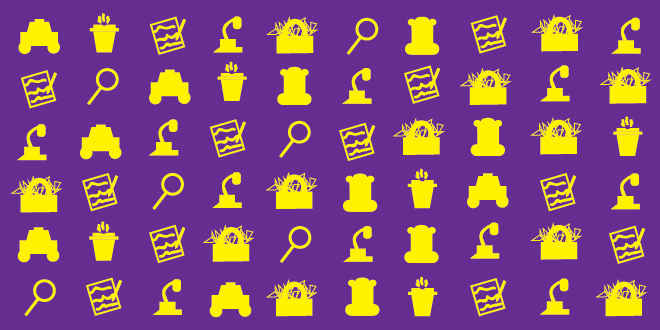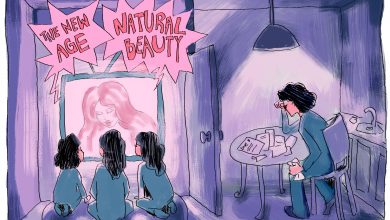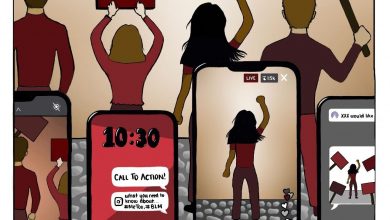Expanding Empathy in the Wake of the Muslim Ban(s)

Illustration by Kitty Hu.
Note: The dichotomy between the West vs. the East is highly controversial and oftentimes convoluted to mean civil vs. uncivil. This article uses the term “Western,” not to perpetuate close-minded stereotypes between two hemispheres, but rather to explain the ideas presented in this article in more universally understood terms. Still, we should be critical as to why “Western” vs. “Eastern” has been popularized. For more information about these terms and the Western/Eastern binary, read Edward Said’s “Orientalism.”
A troubling theme has arisen in the media backlash following Trump’s immigration ban. News and opinion sources alike are peppered with stories lamenting the loss of doctors, techies, and “geniuses” that could have contributed to the United States economy. Most stories follow a similar structure: other ethical dilemmas “aside,” they tell a heart wrenching tale of a doctor who cannot return to his patients, or a computer scientist who cannot return to their algorithm.
These stories are worth sharing, and are absolutely integral to the narrative surrounding the Muslim ban, as they demonstrate to the public that Muslims are not terrorists, and humanize them in the face of an administration hell-bent on building fear. However, their extreme prevalence in the media has created a cultural amnesia of sorts about the primary issue at hand: the United States has shut its metaphorical doors to several entire nations of people, based simply on their religion. We should not be putting this primary, devastating ethical dilemma “aside.”
In addition to closing its doors to immigration, the United States has taken a firm stance on its policy towards refugees — simply put, Trump has informed them that they are not welcome here. Although perhaps not as glamorous to the media as stories of intellectual celebrities, refugee lives also matter, and the fact that they can no longer enter the United States is just as horrifying as the ban on doctors and intellectuals.
In emphasizing the tragedy of intellectuals barred from the United States, and in the veiling of average people affected, we have conflated Western tropes of success with a right to live. This point of view is inherently and toxically selfish. We bemoan Trump’s ban on Muslims because it will perhaps result in a decrease in our own quality of life, little consideration given to the quality of life of those fleeing their countries. As a popular Twitter user, @farwz puts it: “not all Muslims/refugees will be doctors and scientists. some of us are dropouts, drive taxis, work at corner stores. we still deserve life.”
The tech industry has been extremely outspoken about Trump’s ban. However, in some cases, attempts to protest the ban’s travesty of basic human rights have only thinly veiled fears about losing valuable workforce in an increasingly competitive market. Immediately following Trump’s announcement of the ban, Mark Zuckerberg posted to Facebook that the ban would “make all Americans less safe by diverting resources.”
Although perhaps true, Zuckerberg’s post misses the point. Our primary concern at this point should be with the people, not the resources affected by the ban. Zuckerberg also fails to put his money where his mouth is. Whereas many other tech executives have pledged funds to the American Civil Liberties Union (ACLU), or promised to hire refugees, Zuckerberg offers no action to follow his lukewarm words. Some tech CEOs, on the other hand, have demonstrated strong humanist values in the wake of the Muslim ban. Airbnb CEO Brian Chesky, for example, has pledged that his company will house refugees for free. This is a move in the right direction for Airbnb, despite their other less-humanist actions and values.
The tech industry’s heavy involvement with this issue has demonstrated a paradoxical combination that has recently exploded: the unsettling intersection of commercialism and activism. Take the recent Superbowl, for example. The programming was rife with politically charged commercials that in some cases seemed to be more about advertising than political and social stances. Some seemed to entirely misunderstand the point they were trying to make in an ironically ill-advised direction, such as Audi’s awkward endorsement of equal pay for equal work, which brought to light Audi’s own questionable history with gender equality.
So when does this advantageous use of political messages to further commercial success become a perversion of activist values? This has been a consistent theme in critiques of modern feminism: that feminist messages have been “co-opted” to an aesthetic form of merchandising, bringing profit to companies but obscurity to the movement’s political power.
Capitalism and philanthropy have an uneasy relationship, especially when it comes to large corporations. It’s sometimes easy to spot pretenders, easy to follow the instinctive sense of disease you feel when you watch a commercial. To be sure though, follow the money — if the company follows its stance with economic aid, the more committed they are to humanist values. Harnessing your purchasing power, and refusing to consume products from companies that are morally problematic, is a way to soothe the uneasy relationship.
Intellectual bias exists not only within the tech industry but also in the entirety of popular culture, in our varying levels of compassion for people that we feel have a higher value in society. But is intellectual bias really a legitimate form of bias? Intellectual bias is, essentially, a cipher for a combination of racial/cultural bias and class bias. To be an “intellectual” in the United States means to have subscribed to Western standards — attended a Western form of university, practiced Western medicine, become versed in Western technology. In Western culture, achieving all of these things often takes a considerable amount of wealth. Therefore, to be an “intellectual,” one must be also be of a higher class.
Videos such as “Meet a Muslim” also subscribe to this value — most Muslims in the short video, intended to humanize Muslim people, are dressed in Western clothing, have Western families, and listen to Kelly Clarkson. Are the only Muslims we are willing to accept those who have presented themselves to us as fully American or as “properly” assimilated? Are we only willing to accept Muslims who wear leather jackets and tight skinny jeans? Are American lives the the only lives we value?
One should not have to prove that they are fully American or Western in order to gain validity from an administration. Nor should one have to justify why they deserve to live in a country, whether that be because they are contributing to the medical field, achieving technological or scientific advancement, or have achieved some sort of celebrity. Every person, no matter how foreign they may seem or how much they have “accomplished,” has a right to live.
Our media spotlight should thus be on the store clerks, the taxi drivers, the produce vendors, the unemployed mothers, the school dropouts, the children. Doctors, intellectuals, and celebrities are certainly valuable to society, and rightfully deserve their citizenship in the United States, but they also are likely lucky enough to already have the resources necessary to hire lawyers or move their families. Let’s not push aside the people whose lives may not be as glamorous.
Furthermore, we should be highly critical of the media’s representation of the Muslim ban, as its tendency towards classism is nothing new. According to some feminist scholars, the War on Terror in the United States has created a cultural dichotomy of Muslim perception: there are “good” Muslims, and there are “bad” Muslims. Bad Muslims are those associated with terror, and good Muslims are those who have assimilated by denouncing their Islamic faith. In this cultural climate, all Muslims, until proven good, are generally assumed to be bad Muslims.
Following 9/11, Muslims were deported and detained at extremely high rates, and accused of being linked to terrorist threats. According to Sunaina Maira, in her essay “Good and Bad Muslim Citizens: Feminists, Terrorists, and Orientalists,” there was a direct correlation between those who were categorized as “bad” and their personal wealth. “Good” Muslims are those who have expressed patriotism, and who have defended their commitment to American values. “Bad” Muslims are more often working class, less assimilated into American culture, and are persecuted as a result.
History seems to be repeating itself as the United States deals with new terror threats, and a government of fearmongers instills panic in the population. Or perhaps a more likely scenario is that history never really changed in this aspect at all. The dust had somewhat settled following the Muslim Ban, and Trump’s vendetta appeared, for the moment, to have been foiled, although a new ban with similar provisions will be implemented March 16th. Legal action will likely again follow, while thousands of Muslim lives hang in the balance.
After a deep sigh of relief, it is vital to examine and reflect on our reactions to the ban. Although some public figures and organizations denounce Islamophobia, to what Islam do they refer? Is it all or any Islam, or is it a specific version of Americanized Islam that both serves corporate interests and assimilates to Western culture? These will be important questions to ask as the Trump administration moves forward with whatever bigotry it has in store for us next.




